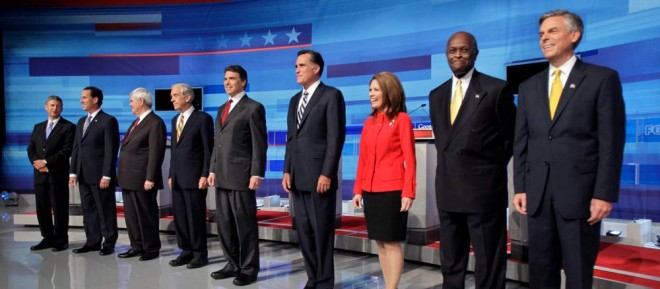Wanted: a Republican saviour
New Jersey Governor Chris Christie might be the man. But is it too late for him?
Share
 If there is one consistent take regarding the Republican nomination race, it is that the field fails to generate much enthusiasm with the base and with independent voters. Rick Perry initially sparked some enthusiasm with social conservatives and the Tea Party, but his recent debate performances have curbed much of the fervour about him.
If there is one consistent take regarding the Republican nomination race, it is that the field fails to generate much enthusiasm with the base and with independent voters. Rick Perry initially sparked some enthusiasm with social conservatives and the Tea Party, but his recent debate performances have curbed much of the fervour about him.
Mitt Romney continues to show more aplomb and skill as a candidate and a debater than in 2008. He did not panic when Perry jumped ahead in the polls. Now, they are nearly dead even, with Romney displaying more presidential poise. Yet, Romney does not excite the base. So far, neither Perry nor Romney has conveyed to the Republican voter that they are the candidate who can beat a now-vulnerable President Obama in November 2012. Why is this?
The GOP has three distinctive movements in its midst this election cycle. The Congressional Republican leadership, while generally intransigent with Obama on policy, recognizes that a 13 per cent approval rating of Congress is not comforting as the election year begins in earnest this January 2012. The strong and militant Tea Party contingent within the GOP House caucus, however, make any reasonable compromise with Democrats nearly impossible, and the voters want more bipartisan compromise to deal with the economy. Finally, the declared candidates for the GOP nomination each seem to be marching to a different drummer and seem out of sync with both the GOP Congressional leaders and some Tea Partiers when it comes to supporting deals with Obama.
True, the Republican Party is more to the right on nearly every issue, including the role of government, taxes, cultural values, and deficits, than any recent version of the GOP. Long-time Republican strategists will tell you that Ronald Reagan and Richard Nixon would be seen as liberals by today’s Republican standards. Yet despite the ideological synergies within the party, there remains unease about who will face President Obama in 2012.
Which brings us to New Jersey Governor Chris Christie, who has repeatedly resisted overtures by prominent and respected established Republicans. Just recently, there are rumblings he may be on the verge of reversing course and saying yes to a 2012 candidacy.
Christie, a blunt-speaking no-nonsense type of leader, is a Republican governor from a blue state (Democratic) and would represent a formidable challenge. His fiscal conservatism, coupled with populist rhetoric, contrast favourably with the slickness of Romney and the radicalism of Perry. In other words, he may be seen as the Republican saviour so many have been clamouring for.
But with well-financed opponents like Romney and Perry currently dominating the contest, Christie would be facing an uphill battle. The primaries will be in full swing in less than 4 months. And not having completed his first term as governor, he will be scrutinized heavily by the field of eight declared candidates .
I would be surprised if Christie reverses course and says yes at this stage. Perry may be facing a critical point in his candidacy and may fade, but with the trend toward front-loading key GOP primary states (Iowa, New Hampshire, South Carolina, and Florida), it may be too late for a candidate like Christie. All this, in the end, will likely favour the early frontrunner—Mitt Romney—making the emergence of a Republican saviour a doubtful proposition at best.
John Parisella is currently serving as Quebec’s Delegate-General in New York City.